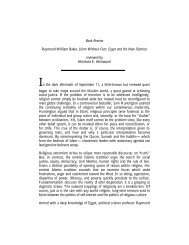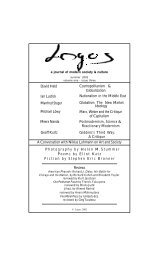Michael J. Thompson Stephen Eric Bronner Wadood Hamad - Logos
Michael J. Thompson Stephen Eric Bronner Wadood Hamad - Logos
Michael J. Thompson Stephen Eric Bronner Wadood Hamad - Logos
Create successful ePaper yourself
Turn your PDF publications into a flip-book with our unique Google optimized e-Paper software.
<strong>Wadood</strong> <strong>Hamad</strong><br />
and certainly by its Shiite and Sunni religious establishments. While not a<br />
phenomenon at the popular level, ethno-sectarian chauvinism has been<br />
institutionalized by the state since its inception: the progeny of the British<br />
concocted Cox-al-Naqeeb plan laying down the foundation for the pyramidal<br />
power structure in the nascent government of Iraq in 1921. To ensure<br />
reliance on foreign forces, state power was entrusted to a minority elite, with<br />
a clear segregation of the largesse among the vying groups: Officers of the<br />
erstwhile Ottoman Army, Sunni landowners and religious notables, and a<br />
handful of Shiite landowners and religious notables and Jewish and Christian<br />
businessmen. 2 The association was entrenched in the belonging to a group,<br />
ethnic, religious or sectarian, rather than to the country Iraq. It may be moot<br />
to question whether that was not a reflection of the lack of a national<br />
identity; however, history indicates that the inhabitants of Iraq had strongly<br />
identified themselves with the land of Mesopotamia, and their association has<br />
since been with it rather than strictly speaking the tribe, or religion or sect.<br />
1958, marking the overthrow of the monarchy and the establishment of the<br />
first republic, ushered in a new period where Iraqis identified themselves as<br />
citizens and not according to tribal, religious or sectarian divides. The<br />
modern political formations, Communist or Pan-Arab—principally the<br />
Baath party, have been clearly secular and encompassed all sectors of society<br />
along ideological rather than ethno-sectarian divisions. The Baath party<br />
slowly degenerated since Saddam Hussein became the “strong man” in the<br />
early seventies, and in the summer of 1979 he consummated his power by<br />
annihilating the leftist wing within the party (led by Abdel Khaleq al-<br />
Samarai, who was summarily purged with more than 50 of his comrades,<br />
most of whom were executed by Saddam and his underlings). During the<br />
1980s Saddam Hussein embarked on entrenching a family-based rule, and<br />
the remnants of the party had become a façade to one of the darkest periods<br />
of Iraq’s history. In the 1990s, with the help of the sanctions, the government<br />
had further degenerated into a brutal mafia-style repression against any<br />
modicum of opposition. The inhabitants of the south, mostly Shias, paid a<br />
particularly heavy price as a result of their uprising following the 1991 Gulf<br />
War. Prior to 1991 the government had forcibly transferred Arabs from the<br />
south to the Kurdish north, especially oil-rich Kirkuk, with the objective of<br />
creating a new demographic reality. Moreover, a diligent student of the<br />
British colonizers, Saddam Hussein fervently adopted an approach favoring<br />
one or other Sunni clan for wealth and governmental positions, and<br />
continually pitted one tribe against the other. This ipso facto created a<br />
<strong>Logos</strong> 2.3 – Summer 2003




